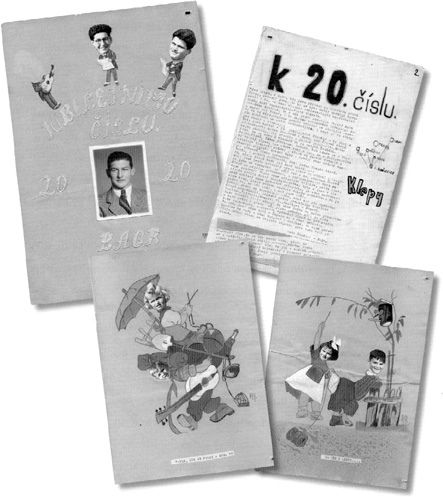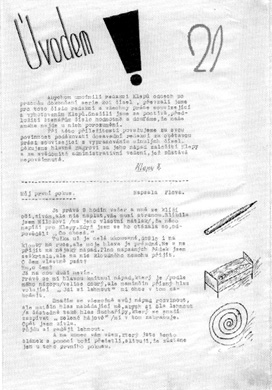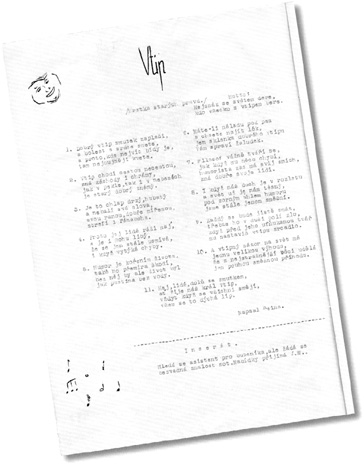
In September 1941, the twentieth edition of Klepy was published. Though Ruda was proud that the magazine had reached this milestone, he was also very troubled.
Ruda always listened carefully when the adults around him talked. He listened to radio broadcasts and read newspaper reports whenever he could. His experience as a reporter had taught him to be a keen observer of details, to ask probing questions, and to read between the lines in order to determine the truth. From letters that other Jewish families had received, he knew about the ghettos in many European cities. There, food was in such short supply that people were starving to death. He could see how things were getting worse for Jews all over Europe.
“How long can we keep writing?” he asked Irena one day as they sat together. “How long can we pretend to be optimistic about the future when things get scarier day after day?”
Irena smiled sadly at her younger brother. He had always been sensitive and perceptive. His intuition had pushed him to think of a way to inspire the youth of Budejovice through the creation of Klepy. That same intuition was now crashing down on him, making him feel more and more disheartened.
“I don’t know if I can keep writing,” he continued. “Each time I hear about prisons and work camps around Europe, I think it’s only a matter of time before we are all sent away.”
Klepy was the most meaningful task he had ever undertaken. It was a mission that had given his life purpose and focus. Ruda knew that he and the other reporters had achieved everything they had originally set out to do – Klepy’s reputation had gone far beyond Ruda’s dreams. But now he felt he had completed his mission. He felt he could no longer write. It was time to step down as the editor.
He gathered his reporters together for a final meeting. “It’s finished for me,” he said. “I’ve written everything I can write.”
At first, his team protested. “You can’t stop, Ruda.”
“Nobody can replace you.”
“The work is too important.”
Ruda agreed, but he said, “I’ve had enough. Besides, I’ve really done everything I set out to do. Look around. People feel proud of our community and proud to be Jewish. I believe that has a lot to do with our commitment to Klepy.”
The boys and girls nodded. It was true that there was a strong sense of pride within the Jewish community of Budejovice. The Nazis might have stripped away their property and belongings, but not who they were inside. Klepy had given people dignity in these terrible times.

Top left: The cover of the twentieth edition, with the original editorial team. Ruda is in the middle, with Rudi Furth (top center) and Jiri Furth (top right). The missing photo (top left) is that of Karli Hirsch. Top right: In the twentieth edition of Klepy, Ruda steps down as editor and encourages everyone to keep their spirits high. Bottom: Photo/drawings from the twentieth edition of Klepy.
“What will happen to the newspaper?” asked Reina Neubauer.
“Maybe someone else wants to take it over,” suggested Ruda. “I’m happy for anyone to do that, if they want.”
That evening, Ruda sat down to write his final editorial. In it, he returned to the original purpose of Klepy: “To give expression to the pride of the Jewish youth of our town; to energize them to physical and mental achievements.… For two summers we have played sport, established friendships, and kept up our spirit.” He ended his editorial by saying, “We hope to meet you again.…”
Ruda’s comments were strong but a bit sad – as if he wasn’t sure that there would be a future for Klepy or for its creators. All across town, people read the editorial and felt desolate and uncertain.
When the winter of 1941 arrived, there were two more issues of Klepy. Milos Konig, a young boy who had written articles for the newspaper, took Ruda up on his challenge to keep it going. He became the editor for these last two issues. But they were not the same as the old Klepy. There were fewer jokes, and the articles were more serious as they looked back at past pleasures and worried about the future. There were wistful poems about memories of the swimming hole, and solemn proverbs that reminded families about sacrifice.
Reina arrived at Ruda’s home to drop off the final edition. “We can’t do it anymore,” he said. “It’s no longer safe for us to meet, and it’s impossible to gather information for articles. We can’t even buy supplies. On behalf of all the reporters of Klepy, I’m bringing the last edition to you.”

A boy named Milos Konig managed the last two editions of Klepy and wrote the editorials.
Ruda took the copy from Reina’s hands with a sinking heart. He missed working on the newspaper. He missed being its leader and editor. But most of all, he missed the freedom it had represented.
“If anything happens to us, this collection must stay together,” Reina continued. “We’re trusting you to find a way to do that.”
Ruda nodded, shook hands with Reina and closed the door. He looked down at the last edition of his treasured newspaper. Then he moved to the kitchen table, reached underneath it, picked up the box that held the entire collection of Klepy, and reverently placed the last edition on the top of the pile.

In the twentieth edition, Reina Neubauer wrote this poem, entitled, “The Joke.” One verse reads,
So people, down with sadness!
Long lives the King of Joke.
As long as we all can laugh,
It is easier to cope.